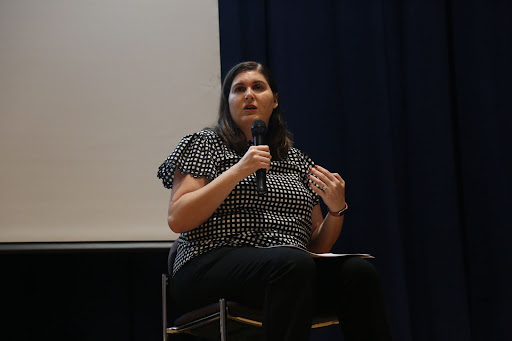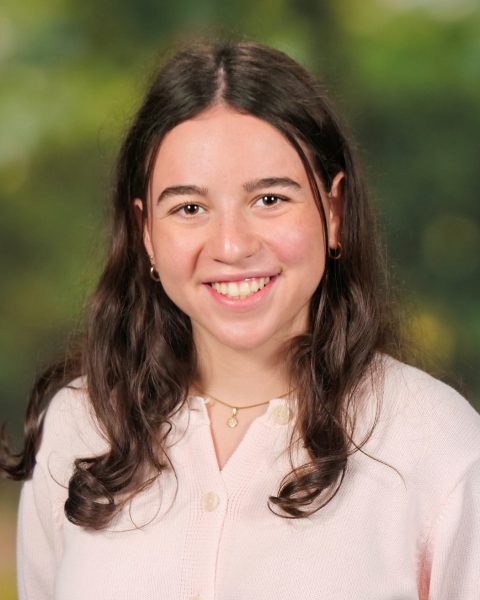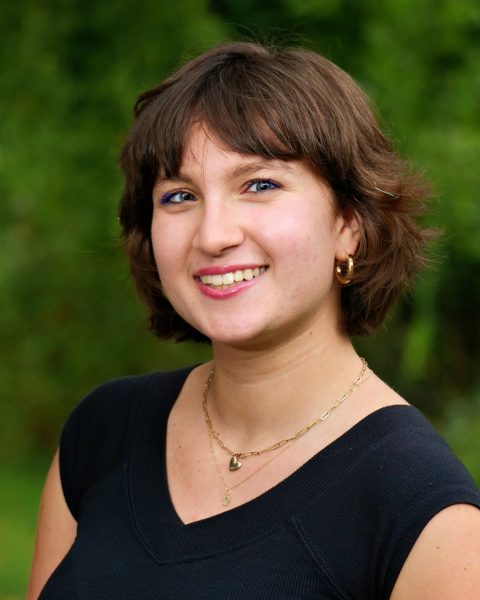Lauren Appelbaum visits JDS Middle School to speak about JDAAIM

Lauren Appelbaum speaks to the Middle School about her organization, RespectAbility.
February 26, 2023
In honor of Jewish Disabilities Awareness, Acceptance and Inclusion Month (JDAAIM) the middle school was visited by Senior Vice President of Communications and Entertainment & News Media, at RespectAbility Lauren Appelbaum on Feb. 22. RespectAbility is a diverse, disability-led non-profit organization that advocates for systematic changes in society’s view of people with disabilities andworks to create more opportunities for people with disabilities.
The presentation was arranged by World Languages Department Chair and Middle School Equity and Inclusion Coordinator Silvia Kurlat Ares. Kurlat Ares said that the middle schoolers have been learning about diversity in their classes and considering it is JDAAIM, this was an opportunity for students to hear from someone with real knowledge and experience on the topic.
“We did not just [want] something abstract, but a real person, talking about a real job that applies to diversity, inclusion and disabilities in the real world,” Kurlat Ares said. “We wanted somebody who can talk about that reality and about their own experiences.”
Appelbaum, who herself has a disability called Reflex Sympathetic Dystrophy, works to increase authentic representation of disabled people on screen and to help disabled people get jobs in the movie and television industries. She also wrote “The Hollywood Disability Inclusion Toolkit,” which teaches entertainment producers how to be inclusive to people with disabilities.
“What we see in media really impacts how we feel and how we act,” Appelbaum said. “I think ensuring that we have diverse representation in entertainment and news media really makes a difference in real life things.”
Appelbaum started the presentation by sharing statistics about people who have disabilities. She shared that 61 million people in the U.S. have a disability. To put this into context, one in four adults live with a disability.
Appelbaum also shared data on people with disabilities in movies and television shows which demonstrated there is a lack of representation of people with disabilities in the film industry.
The students were then shown a few short clips from movies that featured children with disabilities. Eighth grader Leora Blumenthal found the clips to be informative.
“I think it was interesting to see how disabilities were portrayed on TV,” Blumenthal said. “I also thought it was interesting to think about how she said that most people on TV with disabilities are actually actors that don’t have disabilities in real life.”
One of the main goals of RespectAbility is creating inclusive spaces for people with disabilities. Appelbaum shared that there is a difference between a place being accessible for people with disabilities and being inclusive of them. She used the example of a restaurant where sometimes a person with a disability may have to use an entrance where the dumpsters are. She said that even though this is accessible, it is not inclusive.
RespectAbility is not a Jewish organization, however, it was established by three Jewish women. Part of RespectAbility’s work involves faith inclusion. Until this year they have only worked with inclusion for Jews, but more recently they have expanded to other faiths.
Appelbaum said that it is important to her to incorporate her Jewish values into her work and she also intertwined Jewish ideas into her presentation.
“I think no one is defined by any one part of their identity,” Appelbaum said. “Both having a disability and being Jewish are both part of my identity. So growing up Jewish and going to the Jewish Theological Seminary, you learn a lot about values of inclusion. I think that really carries over to this idea that when we are creating spaces, we want to create spaces that are inclusive of disabled individuals.”
Appelbaum sees middle school as an important time to be learning about disabilities because it is when people become more aware of differences that they share with their peers.
“I think it’s really important to talk about that, yes, of course, there might be some differences between individuals, but it’s not something to be scared of, or such,” Appelbaum said. “I think that the more we can realize that disability is not a scary thing, not a bad thing, the more we can be welcoming of our disabled peers.”








